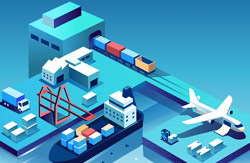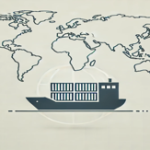Freight forwarders play an indispensable role in the world of international trade. As globalization continues to shape the dynamics of business, the need for seamless, efficient, and reliable logistics solutions has never been more pressing. Exporters face numerous challenges, from complex documentation requirements to navigating various modes of transportation. Here is where freight forwarders come into the picture, ensuring that products reach their destinations without a hitch. This write-up delves into who freight forwarders are, their primary functions, their importance in international trade, and the global operational guidelines they follow. It aims to provide a comprehensive understanding of why they are vital to the success of exports.
Who Are Freight Forwarders?
Freight forwarders are logistics specialists who act as intermediaries between exporters and various transportation services, such as air, sea, road, and rail. They manage the intricate logistics process that occurs from the time goods leave the producer’s premises until they reach their final destination. While they do not usually own the transportation assets themselves, they have in-depth knowledge and connections with a wide range of carriers.
Freight forwarders can be independent companies or part of larger logistics firms, but their core objective remains the same: to ensure goods move smoothly across borders. They are familiar with international regulations, market requirements, and the best routes for specific types of cargo. This expertise enables them to guide exporters through the complexities of the global supply chain, making them essential partners in any export journey.
What Do Freight Forwarders Do?
Freight forwarders provide a wide range of services, making the export process more efficient. Their primary tasks include coordinating shipments, preparing documentation, and negotiating with carriers to secure the best rates for transportation. They are involved in every stage of the logistics process, ensuring that goods are delivered on time and in good condition.
Shipment Coordination
One of the most critical tasks of a freight forwarder is coordinating shipments. This involves determining the most efficient route and method of transportation for the cargo. Freight forwarders assess the type of goods being shipped, the required delivery timeframe, and the destination to select the best mode of transportation, be it by air, sea, or land. They also handle the necessary arrangements for loading, unloading, and storing the goods during transit.
Documentation and Customs Compliance
Navigating the paperwork of international trade can be daunting for exporters. Freight forwarders simplify this process by preparing and managing essential export documents, such as bills of lading, commercial invoices, and certificates of origin. They also ensure that the shipment complies with the customs regulations of both the exporting and importing countries. This aspect of their work is crucial because errors in documentation or customs procedures can lead to costly delays.
Cargo Insurance and Risk Management
Freight forwarders help exporters mitigate risks by offering insurance options to cover potential losses or damages to cargo during transit. This insurance provides exporters with peace of mind, knowing that their goods are protected against unforeseen events such as theft, damage, or accidents. In addition, freight forwarders assess risks along the shipping route and suggest alternative solutions if needed, ensuring the safest journey for the goods.
Warehousing and Distribution
For exporters who need temporary storage before final delivery, freight forwarders can arrange for warehousing services. They often have partnerships with warehousing facilities in strategic locations, providing a secure place to store goods before they are dispatched to their destination. Additionally, freight forwarders coordinate the final distribution of goods, making sure they reach the buyer on time and in excellent condition.
Why Do Freight Forwarders Exist?
The existence of freight forwarders is rooted in the complexities of international trade logistics. Exporters face numerous challenges, including varying regulatory requirements, multiple transportation options, and the need for efficient coordination across different time zones. Freight forwarders bridge these gaps, ensuring a smooth export process.
Their extensive network of contacts with carriers, customs authorities, and warehousing providers allows them to offer end-to-end logistics solutions. This network helps streamline the movement of goods, making them crucial partners for businesses looking to expand their reach across borders. Without freight forwarders, exporters would have to navigate the intricate logistics landscape themselves, which could result in costly mistakes and delays.
Freight forwarders also bring expertise in navigating the often-difficult customs processes, which vary significantly between countries. For instance, some markets may require special permits or certificates for certain products. Freight forwarders are knowledgeable about these requirements and help ensure that shipments comply with the necessary regulations, reducing the risk of delays or penalties.
How Critical Is Their Role in International Trade?
Freight forwarders play a pivotal role in ensuring the smooth flow of international trade. Their ability to coordinate logistics effectively can make or break an export operation. The impact of their services extends beyond just the logistics of shipping goods; they also contribute to the overall success of businesses in the global marketplace.
Cost Efficiency and Competitive Edge
Freight forwarders help exporters reduce costs through their expertise in negotiating freight rates and selecting the most efficient routes. They can consolidate shipments from multiple exporters to fill containers, allowing smaller businesses to enjoy the cost benefits typically reserved for larger shipments. By managing costs, freight forwarders enable exporters to remain competitive in international markets.
Facilitating Market Expansion
For businesses seeking to expand into new markets, freight forwarders act as invaluable guides. They help exporters understand the logistics and regulatory challenges of new territories, allowing them to reach new customers more effectively. This role is especially crucial for small and medium-sized enterprises (SMEs) that may lack the internal resources to manage international shipping on their own.
Enhancing Supply Chain Resilience
In a world where supply chain disruptions have become more frequent, the role of freight forwarders in ensuring resilience cannot be understated. They offer contingency plans and alternative routes in case of unexpected events, such as port closures, strikes, or natural disasters. Their ability to adapt quickly to changing circumstances helps exporters maintain consistent delivery schedules, even in times of uncertainty.
General Operational Guidelines for Freight Forwarders Globally
Freight forwarders adhere to certain operational guidelines to ensure efficiency, compliance, and customer satisfaction. These guidelines serve as a framework for their services, allowing them to operate consistently across different markets while adapting to local requirements.
Compliance with International Regulations
Freight forwarders must stay up-to-date with international trade regulations, including those set by organizations like the International Maritime Organization (IMO) and the International Air Transport Association (IATA). This ensures that they follow best practices in handling cargo and meet the standards for safety and environmental protection. Adhering to these regulations is critical for avoiding legal issues and maintaining a smooth flow of goods across borders.
Transparency in Operations
Transparency is key in the operations of freight forwarders. They are expected to provide clients with clear information about shipping schedules, costs, and any potential challenges that could arise during transit. This openness builds trust between the freight forwarder and the exporter, fostering a positive working relationship that benefits both parties. Transparent operations also help in managing client expectations and ensuring accountability.
Utilization of Technology
The use of technology is a global standard among freight forwarders. From tracking systems that allow clients to monitor their shipments in real-time to automated documentation processes, technology has become integral to their operations. This technological integration not only enhances efficiency but also improves the accuracy of documentation and communication with clients, reducing the risk of errors.
Focus on Sustainability
As global awareness of environmental issues grows, many freight forwarders are adopting sustainable practices. This includes using eco-friendly packaging materials, optimizing routes to reduce fuel consumption, and choosing carriers that prioritize green shipping practices. By focusing on sustainability, freight forwarders align with the expectations of environmentally conscious exporters and consumers, making them a more attractive partner in the export process.
Conclusion: The Unseen Backbone of Export Success
Freight forwarders are the unsung heroes of the export industry, providing the expertise and logistical support needed to navigate the complex world of international trade. Their ability to coordinate shipments, manage documentation, and ensure compliance with regulations makes them indispensable to exporters seeking to expand their global footprint. By offering cost efficiency, market access, and supply chain resilience, they empower businesses to compete and thrive in the international market. Understanding their role and leveraging their services can be the difference between a successful export operation and a costly failure. As global trade continues to evolve, the importance of freight forwarders will only become more pronounced, making them key players in the future of international commerce.
You can contact us on WhatsApp to discuss this topic further.




